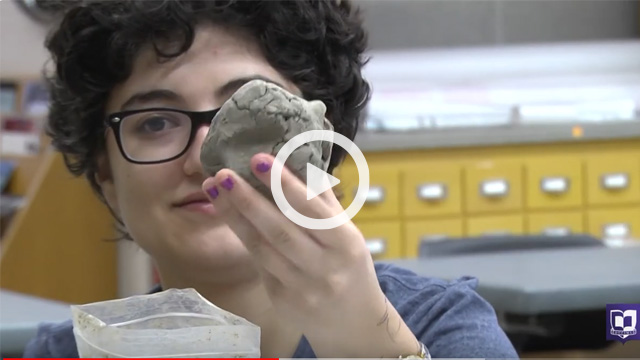Archaeology Major
Archaeology: a multidisciplinary field
The archaeology program at Cornell is highly flexible and intentionally multi-disciplinary. You'll learn how to interpret material remains in order to understand a culture's history, demographics, religions, economic exchange, political systems, and social values.
As an archaeologist, you might specialize in floral and faunal remains and forensic archaeology (ecology and evolutionary biology), the chemical composition of ceramics or preservation of delicate paintings (chemistry), or the petrology and geomorphology of lithics and the ability to survey and map sites (geology).
Or as an archaeologist, you might use computer software to record and catalog data and to map, and reconstruct, ancient sites. Historical archaeologists must be able to read coins, inscriptions, and the preserved writings of a culture (languages).
Finally, archaeologists need to be able to understand human interaction suggested by the art and artifacts of a culture (art history). In short, to be a good archaeologist, you need a broad liberal arts education with emphasis in one or more specific areas.

Cornell Summer Research Institute: x-ray flourescence analysis of archaeological pottery
In her research project, Samantha Nadel '18 teamed up with chemistry professor Cindy Strong to dig into the mystery of why pieces of pottery found in one archaelogical dig didn't appear to match the raw materials available to the people of that area.
This project uses the science and technology available today to study chemical composition of materials to inform us about people who lived one thousand years ago. What topic would you like to research?
Archaeology course and degree requirements

Archaeology includes a set of core courses in the sciences, cultures, and language study. It also includes several options for investigating themes of time and place, along with a choice of electives. Majors will complete one field experience approved by your advisor and an independent senior capstone project that you develop based on your interests.
If you have an interest in graduate school in archaeology, consider completing an additional major or minor in a related discipline, such as art history, anthropology, classical studies, geology, history, religion, or Spanish.

Using archaeology in research
As an archaeology student at Cornell, you'll have the opportunity to participate in summer research domestically or abroad and you will complete a capstone course at the end of your major. Our strong relationship with Iowa State Archaeologist, John Doershuk, frequently extends research opportunities to our students through his lab at the University of Iowa.

Off-campus study is essential for archaeologists
Cornell's One Course At A Time curriculum allows students to delve deeply into the subject matter. One way we do this is through block-long, off-campus courses to places like Greece and Rome. When you're studying just One Course At A Time your classes will have the unique opportunity to leave campus to do field work without disrupting your academic schedule since there are no other classes to compete for your time.
Internships in archaeological fields
One Course At A Time and the flexibility of the block schedule also allow you to undertake internships and other experiences during the academic year through the Berry Career Institute. You also might participate in a summer dig or other summer internship.
Some recent internships conducted by Cornell archaeology students include:
- Office of the State Archaeologist
- University of Iowa, in Israel with an excavation
- Kenchreai Archaeological Field School in Greece under the auspices of the Center for Hellenic Studies
- Cornell Fellowship at The Mexican Museum in San Francisco
What are Cornell students doing in internships? Check out their blogs
Career opportunities for archaeology students
As an archaeologist you might go directly into the field and work in cultural resource management, you may choose to share your knowledge and teach while conducting your own research, or you may find work consulting with others. Employers may include government agencies, museums, colleges and universities, engineering firms, and historical sites. The Society for American Archaeology shares information about careers in archaeology.
The Berry Career Institute can help you identify what you’ll pursue with your interdisciplinary knowledge of history and cultures.


